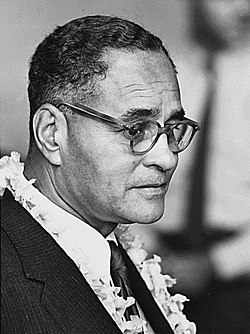Ralph J. Bunche Quote
You can surmount the obstacles in your path if you are determined courageous and hard-working. Never be fainthearted. Be resolute but never bitter.... Permit no one to dissuade you from pursuing the goals you set for yourselves. Do not fear to pioneer to venture down new paths of endeavor.
Ralph J. Bunche
You can surmount the obstacles in your path if you are determined courageous and hard-working. Never be fainthearted. Be resolute but never bitter.... Permit no one to dissuade you from pursuing the goals you set for yourselves. Do not fear to pioneer to venture down new paths of endeavor.
Tags:
problems
Related Quotes
It is as difficult for most poor people to truly believe that they could someday escape poverty as it is for most wealthy people to truly believe that their wealth could someday escape them.
Mokokoma Mokhonoana
Tags:
a breeze, a cinch, a piece of cake, a snap, arduous, arduousness, arrogance, arrogant, back breaking, bankrupt
About Ralph J. Bunche
Ralph Johnson Bunche ( BUNCH; August 7, 1904 – December 9, 1971) was an American political scientist, diplomat, and leading actor in the mid-20th-century decolonization process and US civil rights movement, who received the 1950 Nobel Peace Prize for his late 1940s mediation in Palestine. He is the first black Nobel laureate and the first person of African descent to be awarded a Nobel Prize. He was involved in the formation and early administration of the United Nations (UN), and played a major role in both the decolonization process and numerous UN peacekeeping operations.
Bunche served on the US delegation to both the Dumbarton Oaks Conference in 1944 and United Nations Conference on International Organization in 1945 that drafted the UN charter. He then served on the American delegation to the first session of the United Nations General Assembly in 1946 and joined the UN as head of the Trusteeship Department, beginning a long series of troubleshooting roles and responsibilities related to decolonization. In 1948, Bunche became an acting mediator for the Middle East, negotiating an armistice between Egypt and Israel. For this success he was awarded the Nobel Peace Prize in 1950.
Bunche continued to serve at the UN, working on crises in the Sinai (1956), the Congo (1960), Yemen (1963), Cyprus (1964) and Bahrain in 1970, reporting directly to the UN Secretary-General. He chaired study groups dealing with water resources in the Middle East. In 1957, he was promoted to Under-Secretary-General for special political affairs, having prime responsibility for peacekeeping roles. In 1965, Bunche supervised the cease-fire following the war between India and Pakistan. He retired from the UN in June 1971, dying six months later.
In 1963, he was awarded the Presidential Medal of Freedom by President John F. Kennedy. At the UN, Bunche gained such fame that Ebony magazine proclaimed him perhaps the most influential African American of the first half of the 20th century and "[f]or nearly a decade, he was the most celebrated African American of his time both [in the US] and abroad."
Bunche served on the US delegation to both the Dumbarton Oaks Conference in 1944 and United Nations Conference on International Organization in 1945 that drafted the UN charter. He then served on the American delegation to the first session of the United Nations General Assembly in 1946 and joined the UN as head of the Trusteeship Department, beginning a long series of troubleshooting roles and responsibilities related to decolonization. In 1948, Bunche became an acting mediator for the Middle East, negotiating an armistice between Egypt and Israel. For this success he was awarded the Nobel Peace Prize in 1950.
Bunche continued to serve at the UN, working on crises in the Sinai (1956), the Congo (1960), Yemen (1963), Cyprus (1964) and Bahrain in 1970, reporting directly to the UN Secretary-General. He chaired study groups dealing with water resources in the Middle East. In 1957, he was promoted to Under-Secretary-General for special political affairs, having prime responsibility for peacekeeping roles. In 1965, Bunche supervised the cease-fire following the war between India and Pakistan. He retired from the UN in June 1971, dying six months later.
In 1963, he was awarded the Presidential Medal of Freedom by President John F. Kennedy. At the UN, Bunche gained such fame that Ebony magazine proclaimed him perhaps the most influential African American of the first half of the 20th century and "[f]or nearly a decade, he was the most celebrated African American of his time both [in the US] and abroad."
